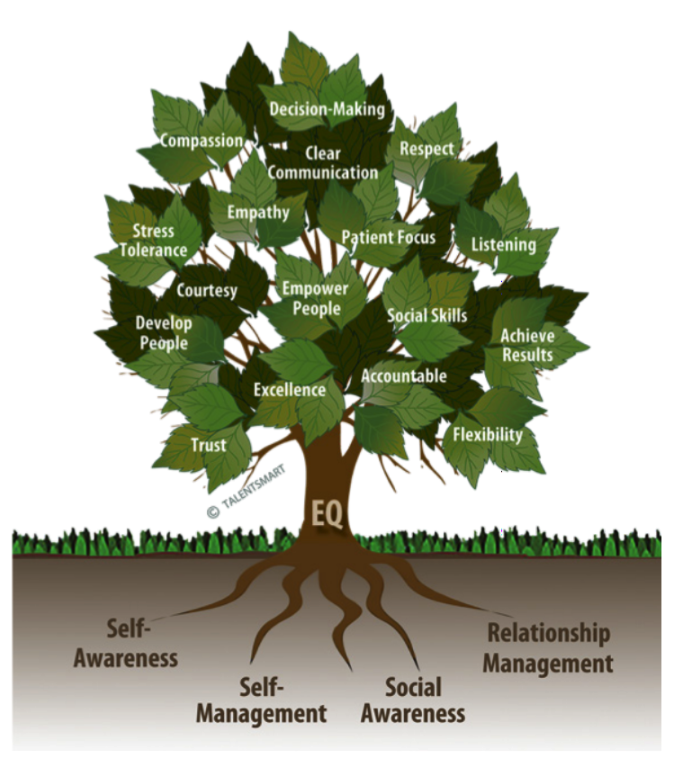
“What is remarkable is not merely the consequences of a doctor’s negative emotions. Despite research showing that most patients pick up on the physician’s negativity, few of them understand its effect on their medical care.” patient care
-Jerome E. Groopman, M.D. Chair of Medicine at Harvard Medical School
When it comes to patient care, there’s really no such thing as a simple interaction. With health and money top of mind, patients and their families’ emotions inevitably run high and health care professionals rely on an arsenal of interpersonal skills to navigate these tough interactions.
A TalentSmart certified trainer from a major medical center in California shared one example of patients coming into an imaging center for CT scans. Before they even come in, many patients are already frustrated, angry, and scared. And on top of that, it’s not uncommon for imaging departments to fall behind schedule or experience a mechanical issue. For staff, this means trying to keep patients calm and comfortable throughout their wait and appointment, which often entails long periods of time in a claustrophobic environment. Doing so requires empathy, active listening, immediate connection, a high degree of professionalism, and the ability to adjust their approach to meet each patient’s feelings and needs.
The good news is that all of these necessary “soft skills” can be improved simultaneously by practicing one skillset: emotional intelligence (EQ). Emotional intelligence is your ability to recognize and understand emotions, and your skill at using this awareness to manage yourself and your relationships with others.

HCAHPS (Hospital Consumer Assessment of Healthcare Providers and Systems), the standard patient care survey administered across hospitals, includes 16 questions (of 25 total) about behaviors that can be connected directly to EQ skills. And research over the last decade shows that this overlap of HCAHPS behaviors and EQ skills is more than just a coincidence. EQ drives successful patient care across a variety of positions and experience levels in the hospital environment: patient care
- Nurses: Nurses high in social competence are better able to attend to their patients’ comfort. They’re also better equipped to work with a patient’s family or advocate by showing understanding and addressing concerns and questions.
- Nursing teams: So much of the work done in the hospital is done by teams, and patients feel the dynamic of the whole team during their stay. It’s incredibly important, for example, for a patient to feel comfortable through the transition from one nurse’s shift to the next. And, it’s important that the patient feels like the team is communicating behind the scenes so that the patient doesn’t have to ask the same questions or repeat the same responses. Teams of nurses high in EQ, especially in the skill of emotion management, are rated by patients as having better overall quality of care and as being more cohesive as a group.
- Physicians: Physicians high in EQ have been found to deliver an overall higher level of patient care than other physicians. Physicians who are self-aware and can self-manage are better able to do things like listen actively, choose their words wisely as they share difficult news or complicated information, and deliver thoughtful care.
- Surgeons: High EQ has a very positive effect on patient-surgeon relationships. Specifically, this study found that surgeons high in EQ built greater rapport more quickly because they were better able to empathize with patients and express empathy in a way that resonated with the patient. patient care
- Medical students, residency, and beyond: Beginning with medical students, studies have found that students with higher EQ ratings scored more highly in patient care surveys. The trend persisted through residency and up into the level of doctor. For medical students, EQ skills can help them establish trust and professional respect from patients. It can also help them learn by developing strong relationships with doctors and other staff. patient care
- All hospital staff: One of the most interesting findings with emotional intelligence in healthcare comes from a study in Greece where they found that different staff relied on different aspects of EQ to succeed on the job. Physicians relied heavily on self-management to deal with stress and workload, nurses on self-awareness and social awareness to manage their constant stream of human interactions, and administrative staff on relationship management skills to navigate the variety of conversations from patients and other staff.
From Insights to Action. Perhaps the most important finding in emotional intelligence research is that it is a highly flexible skill. With practice, people who measure low in EQ can work to improve a specific EQ skill within six months to a year.
To learn more about emotional intelligence and TalentSmart’s EQ products and services, contact TalentSmartEQ at 888-818-SMART or visit us at https://www.talentsmarteq.com/contact-us/.